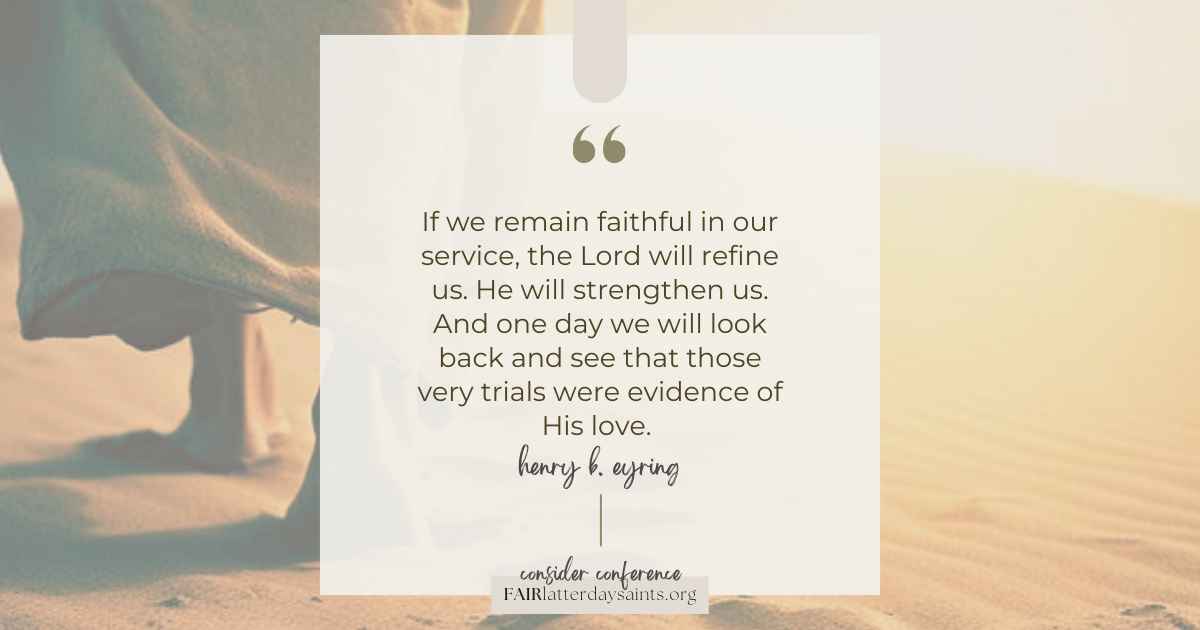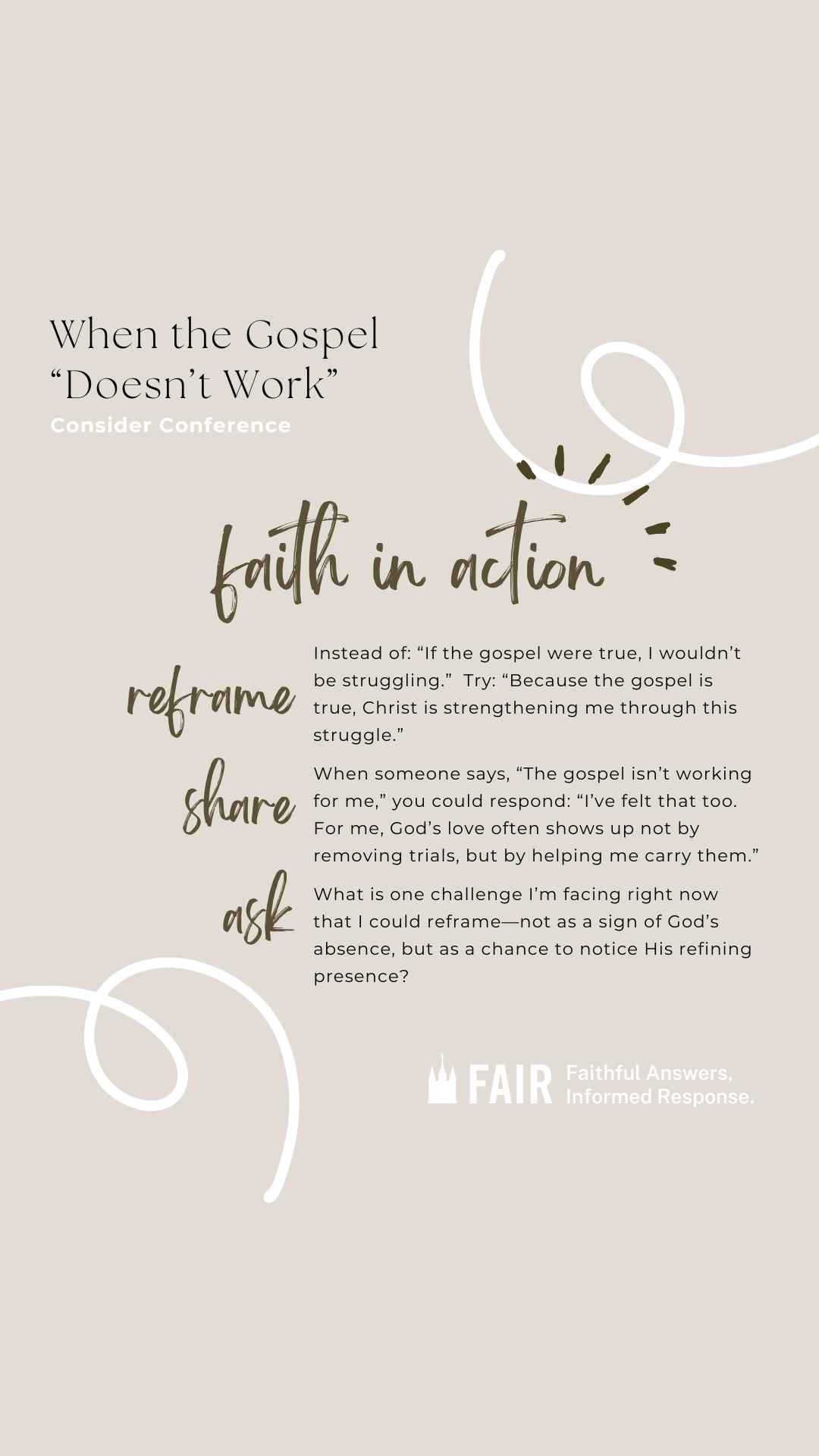
In his October 2025 General Conference address, Proved and Strengthened in Christ, President Henry B. Eyring taught that times of trial and discouragement are not signs of God’s abandonment but evidence of His love. The Lord “proves” His children, not by granting ease or worldly success, but by refining them into disciples who can bear the weight of eternal life.
Some feel discouraged or even lose faith when they feel the gospel is “not working”. When health fails or hoped-for blessings never materialize, there’s a temptation to think that God has ‘let us down’. But this expectation rests on a counterfeit view of the gospel, one that measures God’s goodness by our comfort and success. President Eyring’s message answers that misconception: trials are not failures of the gospel but the very means by which it transforms us into Christlike beings.

Common Criticism: The Gospel Isn’t Working for Me
There are former members of the Church – and even some current members — who feel that if the gospel were true, their lives should be easier, happier, or more successful. When illness persists, relationships falter, or blessings don’t come, they conclude that God and the gospel have failed them.
Fallacy at Work: Prosperity Bias
Prosperity Bias is the tendency to measure truth or divine favor by how comfortable, successful, or easy life feels.
It is a form of confirmation bias: when things go well, we assume God is near; when hardships come, we assume He has failed us.
Many who struggle say the gospel “isn’t working” because it didn’t insulate them from illness, disappointment, or grief. Prosperity Bias creates a false standard for God’s love—equating it with worldly ease or other expectations—so when trials arise, they conclude God has abandoned them.
President Eyring’s Correction:
Brothers and sisters, your proving and strengthening may not look like Moroni’s or Jacob’s or the Prophet Joseph’s. But it will come. It may come quietly, through the trials of family life. It may come through illness or disappointment or grief or loneliness. I bear witness that these moments are not evidence that the Lord has abandoned you. Rather, they are evidence that He loves you enough to refine and strengthen you. He is making you strong enough to carry the weight of eternal life.
Eyring’s testimony dismantles Prosperity Bias: true gospel “success” is not measured by prosperity or ease, but by the refining presence of God in our proving moments.
The scriptures reinforce this truth. Moroni, lonely and hunted, still testified of Christ (Moroni 10:1–5). Joseph Smith, in Liberty Jail, cried out “O God, where art Thou?” but was assured that adversity is “but a small moment” (D&C 121:1–8). The Lord’s refining work transforms weakness into strength (Philippians 4:13).
Resolving this Fallacy: The gospel is not a prosperity contract or a self-fulfillment program. It is a redemptive, covenantal relationship between us and Christ. Misunderstanding this leads to disillusionment: when trials come, people assume the gospel is “not working” because it didn’t deliver comfort or success. But that is a counterfeit lens. The true gospel is working whenever it brings us closer to Christ, even (and especially) in hardship.
When we face proving moments, the Lord is not failing us—He is forming us. The question is not, “Why is the gospel not working?” but rather, “How is God shaping me through this?” In that reframing, every trial can become evidence of His love and a step toward reconciliation with Him.
Living Apologetics: Trials as Refinement, Not Failure
Many of us quietly wonder if our faith is “working” when life is heavy. The apologetic answer clarifies the error of Prosperity Bias—but living the gospel means moving beyond the analysis. President Eyring invites us to see proving moments as God’s training ground, not His absence.
Living this perspective means learning to spot God’s hand in the middle of weakness, reframing discouragement as evidence of His refining love, and sharing that witness with others who feel weighed down. The gospel “works” not by removing our struggles but by transforming us within them—and that transformation becomes one of the most powerful testimonies we can bear.
- If someone says: “I’ve tried living the gospel, but it’s not working—life is still full of problems.”
- You can respond: “I’ve felt that too. What I’ve learned is that the gospel isn’t about erasing struggles—it’s about who we become through them. My hardest moments are often where I’ve felt Christ the closest.”
Ways to Apply Today:
1️⃣ Notice Christ’s strength in weakness. Keep a simple record this week of moments when you felt supported, even in something small.
2️⃣ Reframe discouragement. When a trial weighs on you, pause and ask: What might God be building in me through this?
3️⃣ Turn experience into testimony. Share one example—big or small—with a friend, loved one, or in a journal, where a struggle helped you grow closer to Christ.
Keep This Talk With You
President Eyring’s reminder is simple: life’s hardest seasons are not detours from discipleship but the very ground where discipleship takes root. God is shaping us, often quietly, through the disappointments, illnesses, and griefs we wish would pass.
To carry this message into your week, try:
- Pause in a moment of discouragement and ask: How is God refining me here?
- Write down one small way you’ve felt strengthened in the past month.
- Encourage a friend or family member who feels forgotten—remind them they are being strengthened, not abandoned.
“The Lord proves us … to strengthen us. That proving does not come in moments of ease or comfort. It comes in moments when we feel stretched beyond what we thought we could bear. The Lord teaches that we are to continue to grow and never tire in our efforts, that we never give up, that we keep trying. When we continue to have faith in Jesus Christ—even when things might feel impossible to us at the moment—we become spiritually stronger.” – President Henry B. Eyring, Proved and Strengthened in Christ
Where in your life right now might God be using struggle as His way of preparing you to carry the weight of eternal life?

The Consider Conference series by FAIR offers an in-depth look at recent General Conference talks to help members of the Church of Jesus Christ of Latter-day Saints navigate common questions, misunderstandings, and criticisms. Each post provides doctrinal insights, historical context, and practical ways to apply gospel principles in everyday conversations. Through this series, we hope to equip readers with faith-promoting resources that encourage thoughtful reflection, respectful dialogue, and a stronger foundation in gospel truths, fostering both personal conviction and meaningful discussions with others.
The post When the Gospel “Doesn’t Work” appeared first on FAIR.
Continue reading at the original source →




